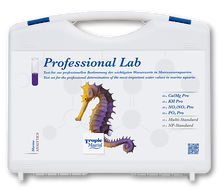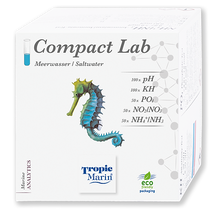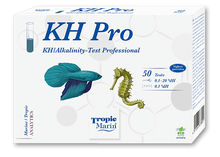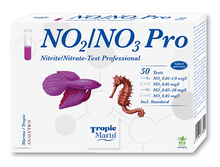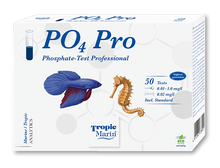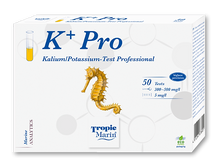
Compact Lab
For determining the essential water values in seawater aquariums
The test set Tropic Marin® Compact Lab includes all the important tests for prompt and precise determination of water values. The pH value, alkalinity, phosphate level, nitrite and nitrate content as well as the ammonia concentration of the water influence the wellbeing of fish and invertebrates in seawater aquariums to a decisive degree. With this test set it is possible to check all of these values.
The inset of the reagent bottles are color-coded and can also be used outside the carton for clear storage. For rapid and safe execution, the instructions of use also include an illustrated quick start guide for each parameter.
Benefits:
• To determine the essential water values in seawater aquariums with one test set
• With pH-test for approx. 100 applications
• With KH/alkalinity-test for approx. 100 applications
• With phosphate-test for approx. 50 applications
• With nitrite/nitrate-test for approx. 50 applications
• With ammonium/ammoniac-test for approx. 50 applications
K+ Pro Test
PO4 Pro Test
For high precision determination of the phosphate concentration
Phosphates (PO43–) are important nutrients for all plants and are vital for the energy metabolism of every living cell. Phosphates are released into the aquarium water via food and the decomposition process of organic matter. However, an unregulated increase in the phosphate concentration creates problems, such as significant algae growth. In addition, phosphates in salt water aquariums can seriously inhibit the deposition of calcium carbonate in the skeleton formation process of hard corals and, in turn, for their growth. On the other hand, there can be a shortage of phosphate if there is a high stock of plants and / or corals and a low fish population. In this situation, phosphate will need to be added. Some reef aquariums are intentionally set up to have ultra-low nutrient conditions – phosphate shortages can occur in cases such as these.
The phosphate concentration in natural saltwater is approximately 0.06 mg/l (ppm). However, the phosphate concentration in coral reefs may be much lower, typically between 0.01 and 0.02 mg/l (ppm). The objective is to establish an appropriate level in relation to the number and type of aquarium inhabitants. In freshwater applications, a phosphate concentration of up to 0.4 mg/l (ppm) is suitable; however 1 mg/l (ppm) should not be exceeded. Even a concentration of 0.02 mg/l (ppm) is adequate for supplying aquatic plants with nutrients. Therefore, the phosphate concentration in the aquarium water should be tested regularly.
With the high resolution Tropic Marin® Phosphate-Test Professional the phosphate concentration can be determined with a particularly high accuracy in the low concentration range between 0.01 and 1 mg/l.
Benefits:
• Measurement range: 0.01 – 1.0 mg/l (ppm)
• Accuracy: 0.02 mg/l (ppm)
• For determining the phosphate concentration in aquaria
• Incl. comparator and phosphate standard to check function and shelf life of the test reagents
• Sufficient for approximately 50 applications
NO2/NO3 Pro Test
For high precision determination of the nitrite and nitrate concentration
Nitrate ions (NO3–) are formed from ammonium (NH4+) as the end product of the nitrification process. Nitrite (NO2–), which is highly toxic to freshwater species in particular, is produced in the first stage of the bacterial process. If the nitrification process works, nitrite is converted to the comparatively non-toxic nitrate in the second stage. Increased levels of nitrite above 0.05 mg/l (ppm) are usually found in tanks that are in their maturation phase or in tanks with nitrate filters.
Nitrate affects the quality of the water in the aquarium: Higher concentrations of nitrate in saltwater aquariums will end up inhibiting the growth of delicate coral. An algal bloom is often the result of a high nitrate level in an aquarium. Some reef aquariums have ultra-low nutrient conditions – nitrate shortages can occur in cases such as these. Therefore, the nitrate concentration in the aquarium water should be tested regularly. It is advisable to keep the nitrate concentration in freshwater aquariums below 50 mg/l (ppm), whereas the concentration should not exceed 20 mg/l (ppm) in saltwater applications. When nurturing hard coral, the aim is to keep the nitrate concentration below 10 mg/l (ppm). Lower limits for nitrate depend on the general conditions in the aquarium.
With the high resolution Tropic Marin® Nitrite/Nitrate-Test Professional the nitrite and nitrate concentrations can be determined with a particularly high accuracy in the low concentration range between 0 and 1 ppm for nitrite and between 0 – 20 ppm for nitrate.
Benefits:
• Measurement range: NO2 0 – 1,0 mg/l (ppm)
• Measurement range: NO3 0 – 20 mg/l (ppm)
• Accuracy: NO2 0.002 mg/l
• Accuracy: NO3 0.05 mg/l
• For determining the nitrite/nitrate concentration in aquaria
• Incl. comparator and phosphate standard to check function and shelf life of the test reagents
• Sufficient for approximately 50 applications
KH Pro Test
The carbonate hardness (KH) or alkalinity of a water sample characterises the buffering capacity, i.e. the ability to maintain the pH value of the water. There are many terms in water chemistry to describe the buffering capacity with varying definitions. The term “carbonate hardness” is customary in fishkeeping; however, it is the alkalinity which is measured. In this test, both terms are used synonymously. The reading for alkalinity is usually given in degrees of German hardness (°dH).
The alkalinity should be tested in all aquariums with great regularity. If the alkalinity in the aquarium is too low, the pH value can sink (sudden drop in acidity) to a level which is life-threatening for many fish and invertebrates. In reef aquariums, an adequate alkalinity level is essential for strong coral growth. On the other hand, an overly high alkalinity in saltwater tanks can lead to calcium carbonate precipitates and also have a negative impact on coral growth. The alkalinity in saltwater aquariums should range from 6 to 9 °dH. The alkalinity in freshwater aquariums should not fall below 3 °dH.
The Tropic Marin® KH/Alkalinity-Test Professional is a high resolution test kit for the determination of the alkalinity with a resolution of up to 0.1 °dH per titration; including a conversion table to other units. Easily recognizable colour change from turquoise blue to pink.
Benefits:
• Measurement range: 0.1 – 20 °dH
• Accuracy: 0.1 °dH
• High-precision determination of alkalinity in aquaria
• Sufficient for approx. 100 applications at a KH of 10 °dH in the water and a resolution of 0.2 °dH / or 50 tests at 0.1 °dH resolution
• Measured on the German hardness scale (°dH)
• Conversion Table for other units in the instruction manual included






